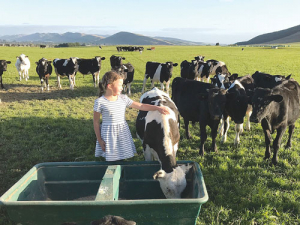DairyNZ and Beef + Lamb NZ wrap up M. bovis compensation support after $161M in claims
Compensation assistance for farmers impacted by Mycoplama bovis is being wound up.
 Ben Walling and Sarah Flintoft’s daughter Grace with animals yet to be culled on their M. bovis-infected farm at Lumsden.
Ben Walling and Sarah Flintoft’s daughter Grace with animals yet to be culled on their M. bovis-infected farm at Lumsden.
Southland beef farmer Ben Walling says he is suing Southern Centre Dairies owner Alfons Zeestraten over the spread of the cattle disease Mycoplasma bovis.
Walling has told Dairy News that he believes Zeestraten knowingly gave him infected animals. He has served notice through his lawyers that he intends to seek damages “for anything MPI doesn’t cover, plus punitive losses and stress”.
Meanwhile, Southern Centre Dairies and Zeestraten have been charged by the Ministry for Primary Industries over the importation of farm machinery in January 2017.
MPI and Chapman Tripp lawyers, acting for Zeestraten, both confirm that those charges do not relate to M.bovis. Chapman Tripp has not responded to a request for comment on the Walling claim.
Walling and his partner Sarah Flintoft run a calf rearing and finishing business at Lumsden.
Their property was declared an infected place in January. They are now clear of the disease and looking to rebuild, but say they may now convert a block to dairying, to become self-sufficient in calves and less susceptible to future disease incursions.
Walling traces his M.bovis infection to a mob of 61 calves he received from Zeestraten on October 24, 2017. He believes Zeestraten would then have known of his M.bovis infection, even though it was not officially confirmed until December.
Walling said many of the mob were “crook” the day they arrived at his farm, and nine were dead by the next day. He kept the rest in the belief they may have had rotavirus or similar but by December they were still not responding to treatment and other calves were also ill.
When rumours reached him that M.bovis was in the district, Walling said he rang all his neighbours and warned them that “we have all the symptoms and they’re dying”. He voluntarily put the farm into lockdown even before it was officially listed as an infected property on January 12.
Although able to keep some bulls on a separate block, they ended up having to kill all their calves -- about 1550 -- including 400 shot on the property, “which at this stage MPI is backing away from paying us for,” said Walling.
About 186 R2 bulls were also killed on the property.
Walling’s usual practice was to buy in about 1500 calves a year, sell half at 100-120kg and continue to rear the rest to two or three years old. This year they were aiming to rear about 2000 calves and keep about 1000.
They also normally winter graze 3500 - 6000 dairy cows but this year could only graze about 3000, on a separate block, because of the lockdown. Walling said they had so far received about $555,000, one quarter of the compensation they are expecting.
He said he did not believe MPI should “willy-nilly” throw public money around -- in some cases to people who were ripping off the system -- but it was ridiculous to still be waiting eight months later.
“They value your stock, they count your stock and put a valuation figure on it. They should be able to write a cheque there and then.”
Meanwhile, Walling said they had a 228ha block consented for dairy about three years ago, to give themselves a choice for the future. Now they had no choice but to go ahead with the conversion -- finance permitting – to become self-contained in the supply of calves.
He had been reluctant because he preferred beef and drystock farming, whereas dairying meant loading up with more staff.
Libby Judson is a keeper of memories from an age gone by. Tim Fulton tells her story.
A New Zealand-first native tree study has highlighted the Bioeconomy Science Institute's position as a forestry research leader.
Hemp fibre processor Rubisco is relocating its core processing facility to Ashburton as part of a $20-$30 million expansion to leverage what it says is an accelerating global demand for sustainable and renewable fibres.
Tradition meets some of the latest in technology at the 2026 East Coast Farming Expo.
OPINION: Trade Minister Todd McClay and the trade negotiator in government have presented Kiwis with an amazing gift for 2026 - a long awaited and critical free trade deal with India.
Former Agriculture Minister Nathan Guy says he's excited about his new role as NZ's Special Agricultural Trade Envoy.